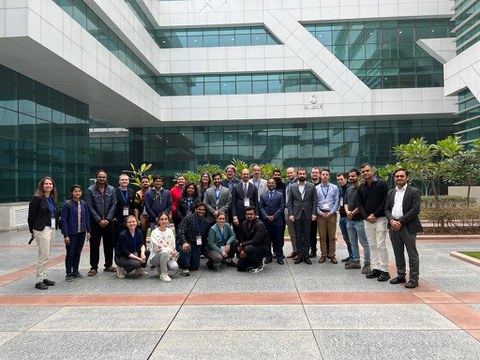Dec 13, 2023
Preventing pollution together - COMPOLL winter school in Delhi
The bilateral project "Combating Environmental Pollution through Internationalization of Education" (COMPOLL) of the Institute of Lightweight Engineering and Polymer Technology (ILK) together with the Institute of Technology Delhi (IIT Delhi) was launched in 2020 as part of the joint call for proposals "Indo-German Partnerships in Higher Education Cooperation" (DIP) of the German Academic Exchange Service (DAAD) and the Indian University Grants Commission (UGC). As part of the program, a winter school took place at IIT Delhi from 26.11. - 02.12.2023 . Together with six students from Germany and one Greek student, a consortium of employees from the ILC, the IAKS and the University of Patras traveled to Delhi to examine environmental problems from different perspectives together with doctoral students and professors from IIT Delhi.
The IAK gave a presentation on the contribution of the circular economy to resource efficiency. Recycling is essential to recover and reuse resources.
The resulting longer useful life of recyclable materials contributes to their resource efficiency. This is measured, among other things, by the Circular Material Use Rate (CMU), which indicates how many of the resources used are secondary resources, i.e. have been recycled. According to the European Sustainable Development Report 2022, the CMU in Germany was just 13.4% in 2020. This means that even the former recycling world champion Germany still has room for improvement in order to become independent of primary resources. In addition to efficiency, the other two sustainability strategies of consistency and sufficiency must also be taken into account. The consistency strategy aims to replace resources with less limited and/or environmentally friendly alternatives, while the sufficiency strategy scrutinizes resource consumption as a whole.
In India, for example, the nutrient cycle could be closed by treating separately collected biowaste. At the same time, an alternative solution could be offered to the burning of residues on agricultural land. In addition to traffic, this promotes the formation of smog in Delhi and therefore also poses a health risk. However, it is important that the solution found is economically feasible without negatively impacting the income of local farmers. Otherwise, the solution will not find social acceptance, as the basic social needs of the population will be restricted, which must be taken into account in a sustainable future just as much as the planetary boundaries.
More about the COMPOLL program can be found on the ILK's website: https://tu-dresden.de/ing/maschinenwesen/ilk/das-institut/international/daad-compoll
The ILK's contribution to the Winter School: https://tu-dresden.de/ing/maschinenwesen/ilk/das-institut/international/daad-compoll/compoll-veranstaltungen/winterschool23

